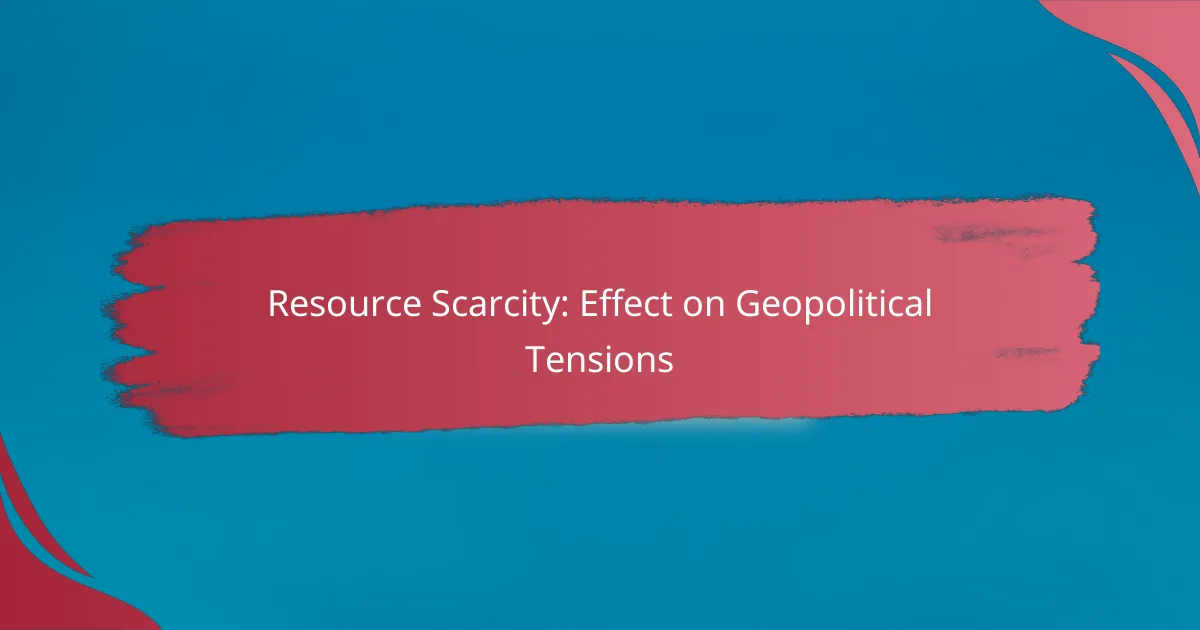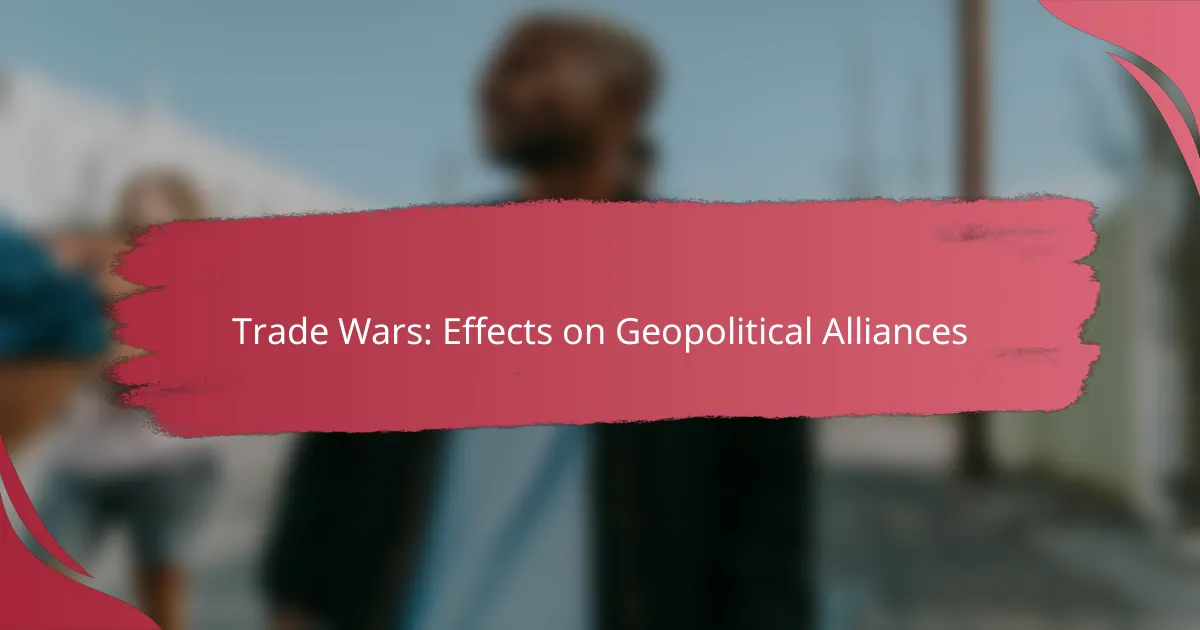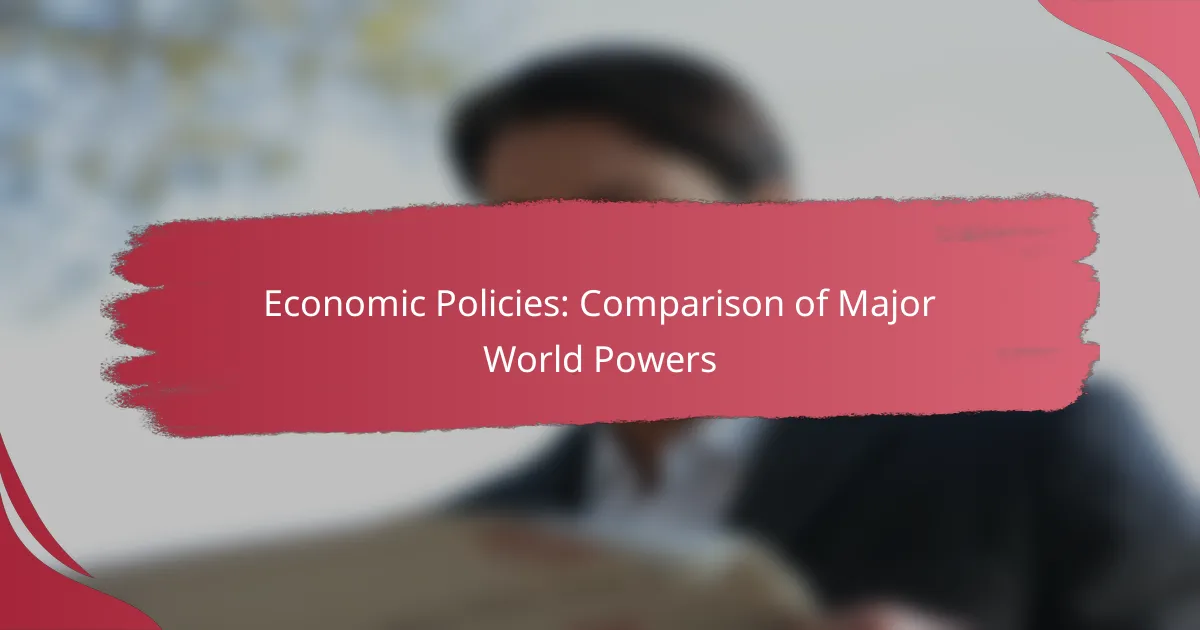Resource scarcity is a critical factor that exacerbates geopolitical tensions, as nations compete fiercely for dwindling supplies of essential resources such as water, energy, and minerals. This competition can lead to aggressive policies, alliances, and even conflicts, particularly in regions like the Middle East, Africa, and South Asia, where access to these vital resources is severely limited. As countries prioritize their national security and economic stability, the potential for instability and conflict increases significantly.
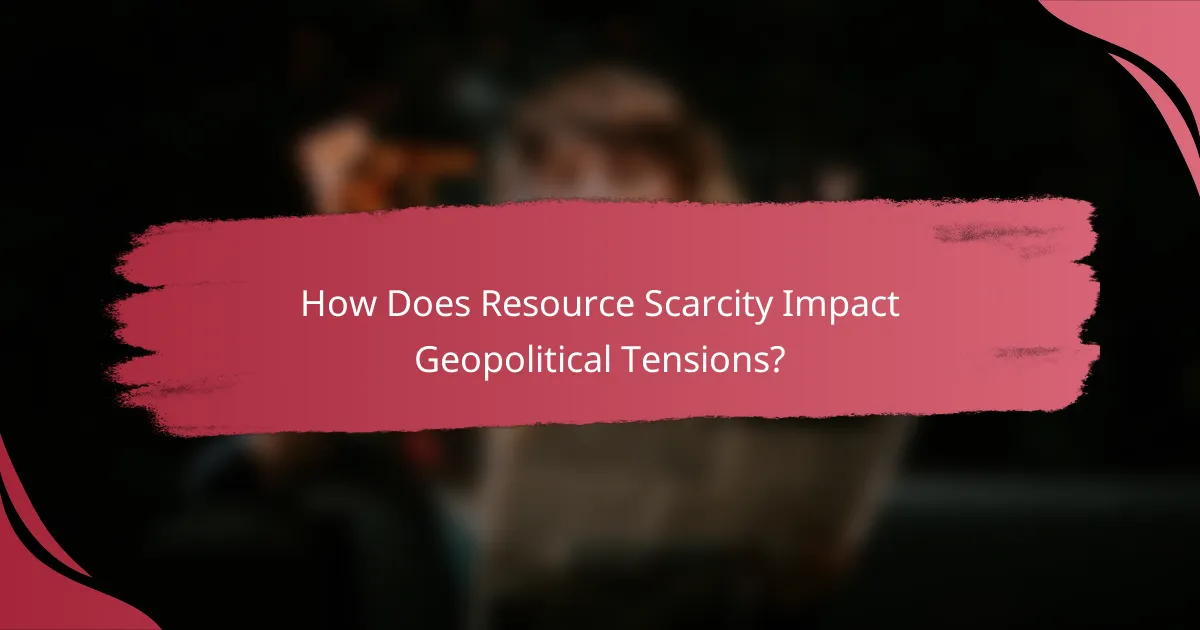
How Does Resource Scarcity Impact Geopolitical Tensions?
Resource scarcity significantly heightens geopolitical tensions by intensifying competition among nations for limited supplies. As essential resources like water, energy, and minerals become scarce, countries may resort to aggressive policies or alliances to secure their access, leading to conflicts and instability.
Increased competition for resources
As resources dwindle, nations often find themselves in direct competition for access to vital commodities. This competition can manifest in various ways, including trade disputes, territorial claims, and military posturing. For instance, countries in regions with rich natural resources may engage in aggressive negotiations or even conflict to secure their interests.
Moreover, emerging economies may challenge established powers, leading to a shift in global dynamics. For example, nations in Africa and South America are increasingly asserting control over their resources, which can provoke tensions with foreign investors and neighboring countries.
Heightened national security concerns
Resource scarcity raises national security concerns as countries perceive threats to their stability and survival. Limited access to essential resources can lead to economic instability, which in turn may prompt governments to adopt more militarized stances. Countries may increase military spending or form alliances to protect their resource interests.
Additionally, nations may prioritize securing supply chains for critical resources, such as rare earth metals or energy supplies, which can lead to strategic partnerships or conflicts. For example, the competition for oil in the Middle East has historically influenced military interventions and foreign policies.
Influence on diplomatic relations
Resource scarcity can strain diplomatic relations as nations grapple with competing interests. Countries that rely heavily on imports for essential resources may find themselves in vulnerable positions, leading to negotiations that can either strengthen or weaken alliances. Diplomatic efforts may focus on securing resource-sharing agreements or trade partnerships.
Conversely, nations rich in resources may leverage their assets to gain political influence, potentially leading to coercive diplomacy. For instance, countries that control significant water sources may use this leverage to negotiate favorable terms with neighboring nations, impacting regional stability.

What Resources Are Most Affected by Scarcity?
Resource scarcity significantly impacts geopolitical tensions, particularly concerning water, energy, and food supplies. These resources are critical for national security, economic stability, and social cohesion, making their scarcity a catalyst for conflict and competition among nations.
Water resources
Water scarcity is a pressing issue affecting many regions globally, leading to disputes over access and control. Areas experiencing drought or over-extraction of water sources often see heightened tensions, especially in transboundary river basins where multiple countries rely on the same water supply.
For instance, the Nile River has been a source of conflict between Egypt and Ethiopia, as both nations seek to secure their water needs amidst growing populations and climate change. Effective management and cooperative agreements are essential to mitigate these tensions.
Energy sources
Energy resources, particularly fossil fuels, are central to geopolitical dynamics. Nations rich in oil and natural gas often wield significant influence, while those dependent on imports face vulnerabilities. Scarcity of energy can lead to competition for resources, resulting in conflicts or strategic alliances.
For example, the competition for oil in the Middle East has historically led to military interventions and political instability. Transitioning to renewable energy sources is crucial for reducing dependency and mitigating geopolitical risks associated with fossil fuel scarcity.
Food supplies
Food scarcity poses a serious threat to global stability, as it can lead to civil unrest and migration. Factors such as climate change, soil degradation, and population growth exacerbate food shortages, particularly in developing countries.
Countries facing food insecurity may resort to protectionist policies, limiting exports to safeguard their populations. This can trigger trade disputes and impact international relations, highlighting the need for sustainable agricultural practices and global cooperation to ensure food security.
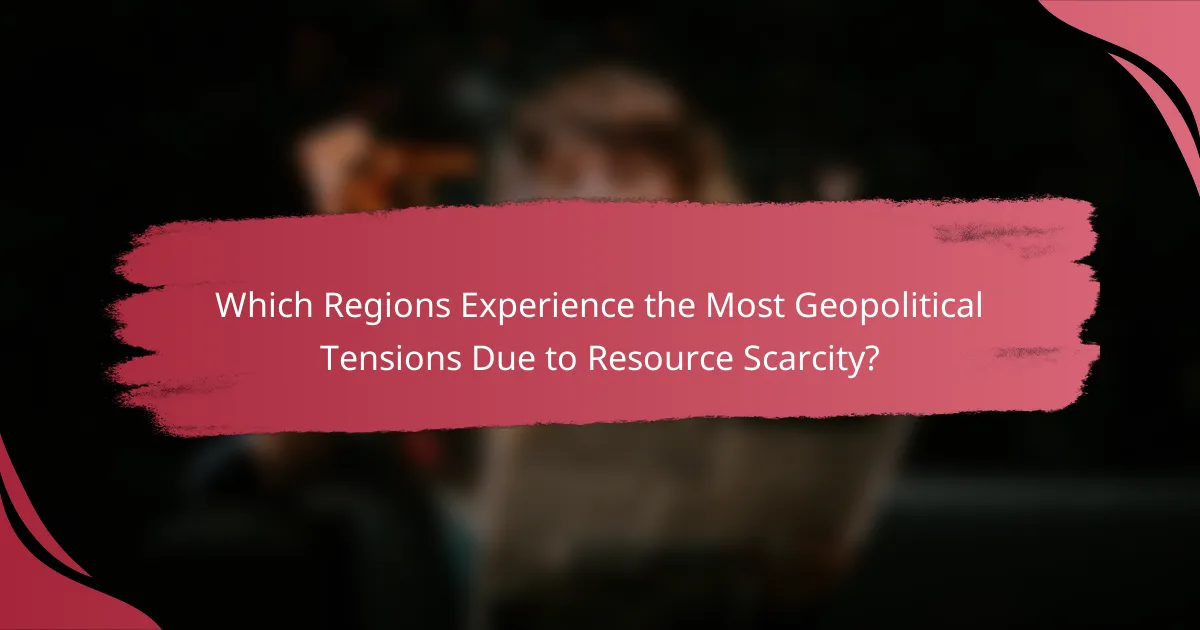
Which Regions Experience the Most Geopolitical Tensions Due to Resource Scarcity?
Regions facing significant geopolitical tensions due to resource scarcity include the Middle East, Africa, and South Asia. These areas often struggle with limited access to essential resources like water, energy, and arable land, leading to conflicts among nations and communities.
Middle East
The Middle East is a prime example of geopolitical tension driven by resource scarcity, particularly concerning water and oil. Countries like Syria and Iraq have experienced conflicts exacerbated by dwindling water supplies from shared rivers such as the Euphrates and Tigris.
Additionally, the region’s reliance on oil has led to power struggles, with nations vying for control over lucrative oil fields. This competition can ignite conflicts, as seen in various historical and ongoing disputes.
Africa
Africa faces significant geopolitical tensions due to resource scarcity, especially regarding water and minerals. The Nile River basin is a hotspot for conflict, as countries like Egypt, Sudan, and Ethiopia compete over water resources essential for agriculture and drinking.
Moreover, the continent’s rich mineral resources, including diamonds and gold, often lead to conflicts fueled by competition and corruption. These tensions can destabilize entire regions, as seen in the Democratic Republic of the Congo.
South Asia
In South Asia, geopolitical tensions arise from resource scarcity primarily related to water and agricultural land. The Indus River basin, shared by India and Pakistan, is a critical area where disputes over water rights have led to heightened tensions between the two nations.
Additionally, climate change impacts, such as erratic monsoons, further exacerbate resource scarcity, leading to food insecurity and potential conflicts. Countries in this region must navigate these challenges carefully to maintain stability.

What Strategies Can Nations Employ to Mitigate Tensions?
Nations can employ various strategies to mitigate geopolitical tensions arising from resource scarcity, including fostering international cooperation, initiating resource-sharing initiatives, and investing in sustainable technologies. These approaches aim to address the root causes of conflict and promote stability through collaboration and innovation.
International cooperation agreements
International cooperation agreements are formal arrangements between countries aimed at addressing shared resource challenges. These agreements can include treaties focused on water management, energy sharing, and environmental protection. By establishing clear guidelines and responsibilities, nations can reduce the likelihood of conflicts over scarce resources.
For example, countries sharing river basins often enter into agreements to manage water usage sustainably, ensuring that all parties have equitable access. Such frameworks can help prevent disputes and foster collaborative problem-solving.
Resource-sharing initiatives
Resource-sharing initiatives involve collaborative efforts between nations to share access to critical resources, such as food, water, and energy. These initiatives can take the form of joint ventures, trade agreements, or regional partnerships that prioritize mutual benefit over competition.
One effective approach is the establishment of regional resource banks, where countries can contribute surplus resources and draw from the pool during shortages. This not only alleviates immediate pressure but also strengthens interdependence and trust among nations.
Investment in sustainable technologies
Investing in sustainable technologies is crucial for reducing reliance on finite resources and mitigating tensions. Nations can focus on developing renewable energy sources, efficient water management systems, and sustainable agricultural practices to enhance resource security.
For instance, countries can collaborate on research and development projects for solar or wind energy technologies, which can significantly decrease dependence on fossil fuels. By prioritizing sustainability, nations can create a more stable and cooperative geopolitical landscape.

How Do Historical Events Shape Current Resource Conflicts?
Historical events significantly influence current resource conflicts by establishing patterns of ownership, access, and exploitation. These legacies often create tensions among nations and communities as they navigate the complexities of resource distribution and control.
Colonial legacies
Colonial legacies play a crucial role in shaping modern resource conflicts. Many countries still grapple with the consequences of colonialism, where resource-rich regions were exploited for the benefit of colonial powers, leaving behind unequal distributions of wealth and power. For instance, in Africa, the arbitrary borders drawn during colonial times often grouped diverse ethnic groups together, leading to ongoing disputes over land and resources.
These historical injustices can fuel resentment and conflict as communities seek to reclaim their rights to natural resources. Understanding these legacies is essential for addressing current geopolitical tensions and fostering equitable resource management.
Past treaties and agreements
Past treaties and agreements often lay the groundwork for contemporary resource conflicts. Many international treaties, such as those governing water rights or mineral extraction, were established under specific historical contexts that may no longer apply. For example, treaties signed in the early 20th century may not account for current population growth or environmental concerns, leading to disputes over resource allocation.
Additionally, the failure to adhere to or update these agreements can exacerbate tensions. Countries must engage in dialogue to renegotiate terms that reflect current realities, ensuring that resource management is fair and sustainable for all parties involved.
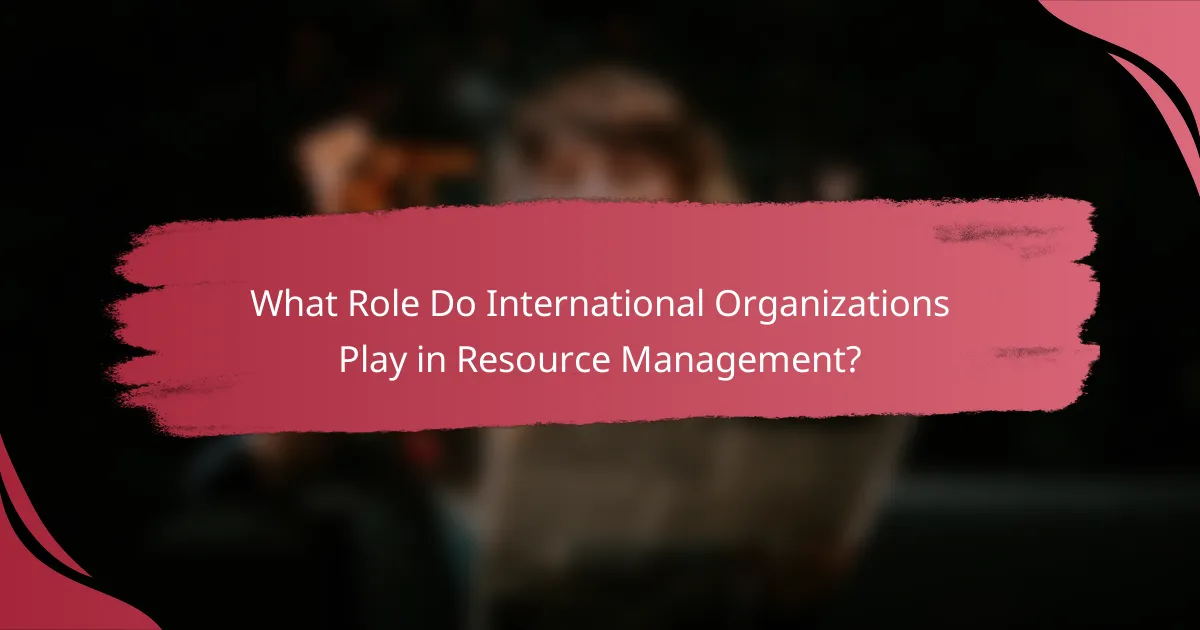
What Role Do International Organizations Play in Resource Management?
International organizations play a critical role in resource management by facilitating cooperation among nations, establishing guidelines, and promoting sustainable practices. They address issues related to resource scarcity, which can lead to geopolitical tensions, by providing frameworks for negotiation and conflict resolution.
United Nations initiatives
The United Nations (UN) has several initiatives aimed at managing global resources sustainably. Programs like the UN Environment Programme (UNEP) focus on environmental protection and the sustainable use of natural resources, while the UN Development Programme (UNDP) works to reduce poverty and promote equitable resource distribution.
One key initiative is the Sustainable Development Goals (SDGs), which include targets for clean water, affordable and clean energy, and responsible consumption. These goals encourage countries to adopt policies that ensure resource availability for future generations, thereby reducing potential conflicts over scarcity.
Additionally, the UN facilitates international agreements, such as the Paris Agreement on climate change, which indirectly impacts resource management by promoting sustainable practices that can alleviate resource shortages. Countries are encouraged to collaborate on solutions that address both environmental and resource-related challenges.
